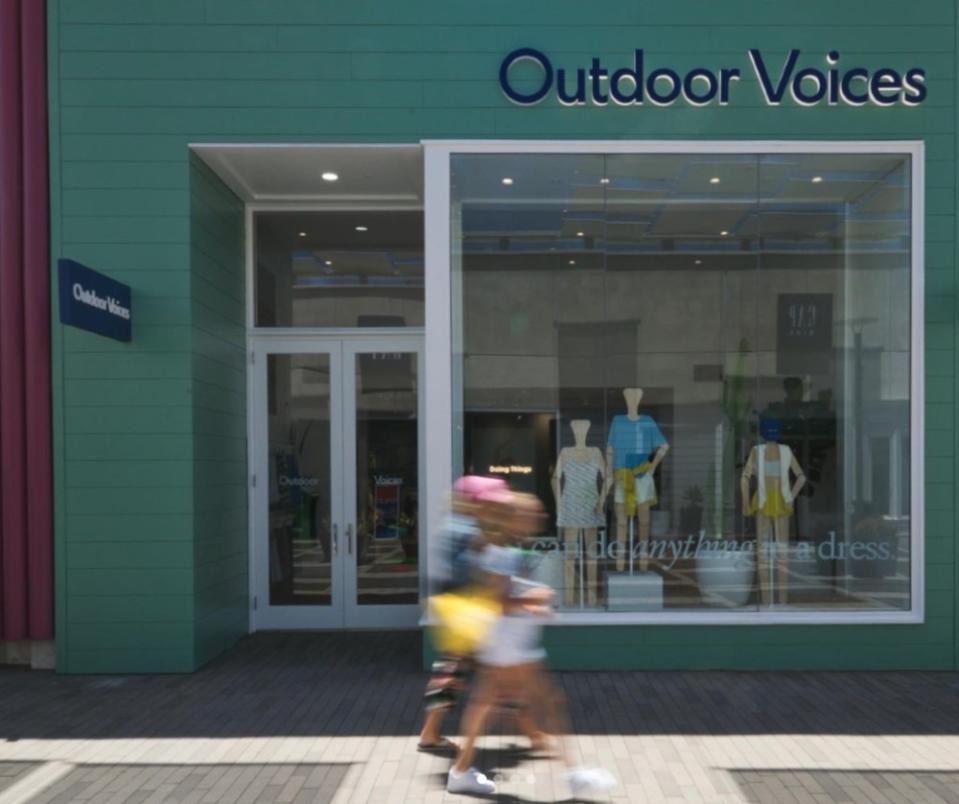Outdoor Voices Bankruptcy Imminent According to Insiders

Outdoor Voices is barreling toward bankruptcy, according to former employees terminated in mass corporate and retail layoffs last week.
The fallen women’s athletic apparel brand reportedly plans to file for an Assignment for the Benefit of Creditors (ABC)—a state-governed insolvency proceeding that keeps the issue out of the courts, and often results in a speedier liquidation of assets than other bankruptcy filings—within the coming weeks.
More from Sourcing Journal
Four former employees at the brand’s Austin, Tex. headquarters, who spoke with Sourcing Journal on the condition of anonymity, said the company’s well-documented cash flow issues have caught up to it. Outdoor Voices stopped paying a number of its vendors, including its apparel and accessories producers, and neglected to pay rent on some of its nationwide stores for months, according to those employees.
Insolvency has all but overtaken the flagging business, they said. In dramatic fashion last Tuesday, the vast majority of the 50- to 60-person corporate workforce was laid off, with less than a dozen roles preserved to deal with the forthcoming liquidation. Team members said they were pulled into Zoom meetings with human resources and told that their positions had been terminated, effective immediately. Some were told that bankruptcy was imminent.
HR also told those impacted by the layoffs that they wouldn’t be receiving severance or payouts for their unused paid time off (PTO)—a position that was reversed this week. On Monday, former employees were told that paying out vacation days had always been the brand’s intention.
After the Austin terminations, the company dropped the hammer on its national retail employees, telling them Outdoor Voices’ 16 stores across cities like Boston, San Francisco, Miami, Chicago, Minneapolis, Scottsdale, Denver and Atlanta would be closing by end of week. They too would be denied severance, they were told—but they would also be expected to work through Sunday to push as much deeply discounted merchandise out the door as possible.
Some stores stayed open until the bitter end, while others, like the Houston location at Heights Mercantile, took a stand. On Friday, a note on the store’s door informed shoppers that the location would be closing early. “We don’t care how far you drove. We are tired, jobless & over this,” it said.
An employee at the brand’s Charlotte, N.C. store told Sourcing Journal there had been rumblings of trouble before the announcement. The brand’s Nashville and Philadelphia stores were shuttered abruptly in January, with corporate liaisons citing “issues with landlords and leases” as the reason for the closures.
Meanwhile, the fourth quarter of 2023 had been peppered with blowout sales that felt like more than the typical holiday rush, the store associate said. Corporate quelled questions from managers with the explanation that the brand was switching factories and wanted to make room for new product. As recently as last week, store staff were receiving shipments of spring apparel, and were working to organize community events like run clubs.
‘The books are bad’
At headquarters, though, former employees said an air of instability persisted for months.
Outdoor Voices’ decline began in earnest years ago, with upper-level mismanagement contributing to debts the company is still working to pay off. Luxe offices filled with extravagances, expensive photo shoots and exotic press events were window dressings that hid a culture widely described as toxic and dysfunctional. Even after founder Ty Haney’s departure from the brand in 2020, the one-time direct-to-consumer darling has been unable to shake that reputation—or sort out its balance sheet.
“The books are bad—that’s what some people would say,” a former corporate employee said.
Lunya founder Ashley Merrill was brought on to the company’s board of directors following Haney’s exit, and has taken much of the heat for the past week’s fallout. The sleepwear entrepreneur took on the role of interim CEO last fall, replacing CEO Gabrielle Conforti, who joined Outdoor Voices three years ago.
One former employee said her understanding was that Merrill already owned a large stake in the athleticwear brand, but “pretty much bought out everyone else” around mid-November. “She was like, ‘I essentially outright own this company now,’” she said.
Merrill told employees at an all-hands meeting in early December that her first priority was fundraising. “She said in that meeting that we should feel secure in our jobs,” she added. “She was, I think, implying that she could financially sustain us until we got there”—“there” being safe in the good graces of another investor or lender.
“It had been a little like sketchy up until then—we were getting [vendors] reaching out to us about not paying them, and our credit cards were turned off,” the former employee said. “It almost felt like, when [Merrill] came on, that the worst was behind us.”
“She made it seem like everything disappeared—she would constantly be like, ‘I was the one who paid all the debts off for the company,’” she added.
But the new executive’s presence also brought fresh anxieties. Described by multiple terminated team members as “reactionary” and “impulsive,” one of Merrill’s first moves as co-CEO was to kill Outdoor Voices’ size-inclusive range, which currently extends to size XXXL. Designs beyond the already-produced seasons would only go up to size XL, she decided in early December. She commissioned re-shoots of campaigns that had already been photographed with models of her choice, all within the new size range.

Moving forward, Merrill insisted that all new designs should be fit to her body, according to the former employees. She allegedly came to the office on Feb. 8 for a product review with about 20 to 30 members of the corporate team, some of whom attended virtually, and modeled the garments in a session that left employees “speechless” and “uncomfortable.” Several reported the incident to HR.
Merrill’s disruptions to the product line also resulted in a backlog of work that put the team behind schedule, the sources said. “You have someone who’s making you work extra hours…and you’re essentially doubling the calendar when you have to redo the whole line for them,” one added.
Meanwhile, the bills still weren’t getting paid.
Another former employee described opening an invoice from Meta for the brand’s Instagram and Facebook pages. “It was for half-a-million dollars, and no one was in the office to open it, to receive it, to look at it.”
“If anyone was a contractor, they were not getting paid on time,” the source said. “We would be missing invoices by months. People needed to pay their bills, and we weren’t fulfilling their invoices.”
Merrill hadn’t paid off the company’s debts either as it turned out—she was trying to have them diminshed. “She was negotiating all the debts down, and what that meant was she was asking our suppliers to absorb some of that debt,” she added. “And I do know that in those meetings [with vendors], the tone literally was, ‘We’ll pay you or we won’t—you’ll take this or get nothing at all.’”
‘Graceful exit strategy’
Despite the abundance of evidence to the contrary, many employees thought the brand might still pull through under Merrill’s direction—that a Hail Mary was still in the works. So the utter dismantling of the brand came as a gut punch for many.
As reported by Sourcing Journal, Outdoor Voices did not file a Worker Adjustment and Retraining Notifications (WARN) in any of the states in which it operates, a requirement of employers with 100 or more employees that are planning mass layoffs. Rick Ostrove, principal trial counsel for Leeds Brown Law, P.C., who specializes in employment law, said the company likely consulted with counsel before the terminations to ensure that they “kept enough [workers] to be under the WARN notice requirement.”
“There are exceptions to the WARN Act, and I don’t know what exception they’re relying on, but it would be extremely unlikely that they would have a mass termination without consulting counsel and getting comfortable that they were in the scope of an exception,” added Jeffrey Chubak, an associate at Amini, LLC focused on bankruptcy, creditors’ rights, and commercial litigation.
The law’s nuances may have worked in the brand’s favor. While Outdoor Voices did employ more than 100 employees nationally, they were only required to disclose forthcoming layoffs in the event of “a worksite closing affecting 50 or more employees, or a mass layoff affecting at least 50 employees and one-third of the worksite’s total workforce…” the Department of Labor states. Only the Texas headquarters could have potentially met that threshold.
What’s more, “the WARN Act makes certain exceptions to the requirements when employers can show that layoffs or worksite closings occur due to faltering companies, unforeseen business circumstances, and natural disasters,” according to DOL. Outdoor Voices could very likely be described as “faltering.”
Ostrove said that the brand’s ultimate decision to pay terminated employees for unused PTO was likely reputational—an attempt to mitigate bad press or restore some goodwill.
“There’s no federal law that requires [them] to pay out PTO—those are state related laws,” he added. California, Colorado and Massachusetts are among the few states that mandate compensation for unused vacation time, while many others defer to company policies or employee contracts to determine payout liability.
Meanwhile, Chubak said that HR’s mentioning of bankruptcy and “ABC law” to former corporate employees “definitely” points to “a liquidation proceeding.”
“The typical reason why people do Assignments for the Benefit of Creditors, which are sometimes referred to in shorthand as ABCs, is financial,” he said. “Chapter 11 is expensive, and doesn’t provide a discharge for liquidating corporations.”

According to the American Bar Association, “In many instances, an ABC can be the most advantageous and graceful exit strategy.” The business liquidation device provides an alternative to formal bankruptcy proceedings, allowing the company to transfer assets to a party tasked with winding down the business “in a manner designed to minimize negative publicity and potential liability for directors and management.”
Contrary to what the term might suggest, creditors—from unpaid vendors and consultants to apparel suppliers—are unlikely to benefit from the proceeding. “It’s commonplace for creditors not to get paid in bankruptcy,” Chubak said. “The norm is for a huge chunk of the creditor pool to take it on the chin.”
For the company’s partners, former employees and even disillusioned fans, the toppling of the once promising enterprise has felt like “a slap in the face,” one former corporate employee said. As for the future of the brand, “I don’t see them lasting past the next month or so,” she added.
Outdoor Voices’ enticing ethos, which prized fun and freedom above performance, now reads as a harbinger of its unraveling. “When you let go of the expectation to perform, that’s when the real magic happens,” the brand’s website says. “You learn that the joy of the game will always outlast a win.”

